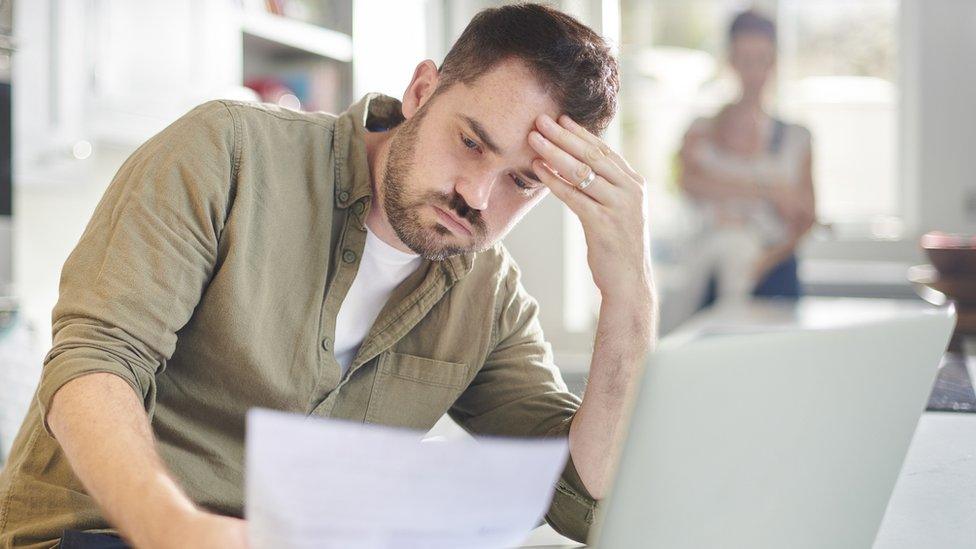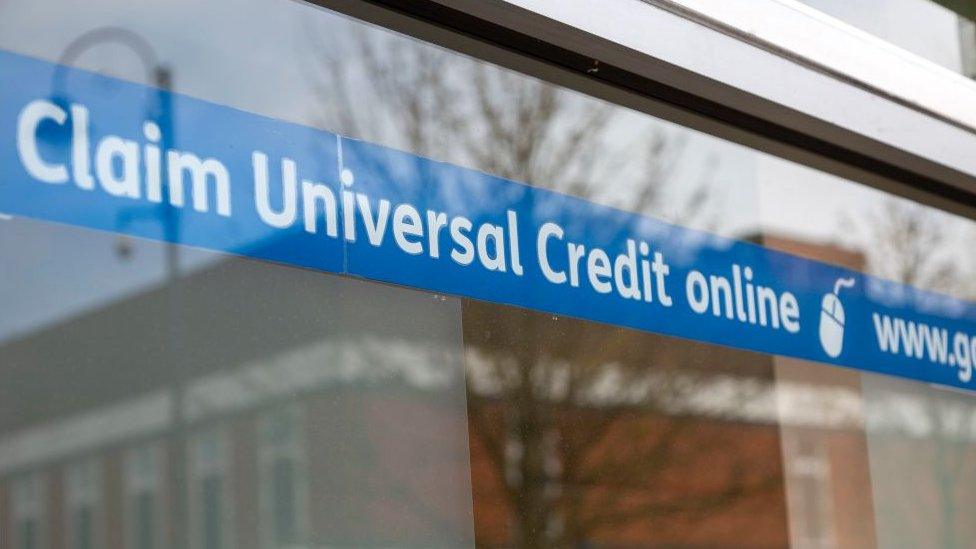Universal credit claimants 'overwhelmed' by debt
- Published

"I just feel like I'll never ever get to the end of this debt", universal credit claimant Dee says.
After being made redundant last year, Dee fears she will have to go further into debt as the cost of living rises.
"I'm very worried now because everything is going up," she says.
Two in five people on universal credit were "forced into a downward spiral of debt this winter" because the payment did not keep up with rising bills the Trussell Trust charity has found.
Dee, who is 60, is one of more than 5.8 million claimants in England, Scotland and Wales, both in and out of work.
She has been paying off a government debt for seven years and has another nine years to repay.
A five-week wait for universal credit claimants to receive the payment meant that Dee had to take an Advance Payment from the government - a loan made to support people until they receive their benefit payment, to manage essential bills and utility costs.
That left her starting out with deductions to her benefits, which were made more acute by a tax credit overpayment - which happens when the benefit system makes overpayments in error.
As the cost of living has increased she has seen electricity bills rise.
Dee, who preferred the BBC not to use her surname, now only buys basic food, and uses the car once a week to keep costs down.
"Things are just so tight that I'm really worried I'll be forced to go into more debt just to afford my current bills," she says.
"To think I won't escape it until my pension years is overwhelming and really drags me down."
Turning fridges off to cut costs
People have not been able to afford heating and have had to turn off their fridges to cut costs, the Trussell Trust said.
The charity commissioned an online survey by YouGov of 1,506 adults claiming Universal Credit between 24 January and 15 February 2022.

The poverty charity, which runs food banks across the UK, found that one in six of those surveyed had visited a food bank at least once since the beginning of December.
One in three people had more than a single day without food or only one meal last month.
Dee also said she had been to a food bank twice because of the price of her weekly shop going up.
Unable to heat homes
"I've got no contingency for emergencies and to have this debt follow you around for so long really gets on top of you," she said.
Dee is also worried she won't be able to afford the increase in her gas bill next month.
The research suggested that one in three universal credit claimants had not been able to afford to heat their homes for more than four days over last month.
Next month, the government will increase benefits by 3.1%, in line with the Consumer Prices Index (CPI) inflation rate in September 2021.
However, the Bank of England expects inflation - the rate at which the cost of living increases - to top 7% this year.
The Trussell Trust said the government's increase was "dangerously insufficient" and called for benefits to increase by at least 7%.
A government spokesperson said it "recognises the pressures people are facing with the cost of living, which is why we're providing support worth £21bn this financial year and next to help".
This support includes an average of £1,000 more per year via changes to Universal Credit, freezing fuel duties and a £9.1bn energy bills rebate, the spokesperson said.
"We're also boosting the minimum wage by more than £1,000 a year for full-time workers and our £500m household support fund is helping the most vulnerable with essential costs," the spokesperson added.
Dee said that universal credit needed to be increased to match the higher cost of living so that she could make ends meet and avoid further debt.
The increase means her benefits are due to go up by £10 a month, which won't cover her electricity bill, which is set to increase by £14 a month, she said.
'Only set to get worse'
Emma Revie, chief executive of the Trussell Trust, said that the rising cost of living was "forcing hundreds of thousands of families across the country into a downward spiral of debt just to get by."
"We know the situation is only set to get worse and we cannot wait any longer.
"That's why we are calling on the UK government to bring benefits in line with the forecast rate of inflation as a bare minimum in the upcoming Spring Statement, to prevent thousands more people being forced into debt and through the doors of food banks."
More than 50 charities, including Save the Children UK and Child Poverty Action Group, have called on the government to increase benefits by at least 7%.

